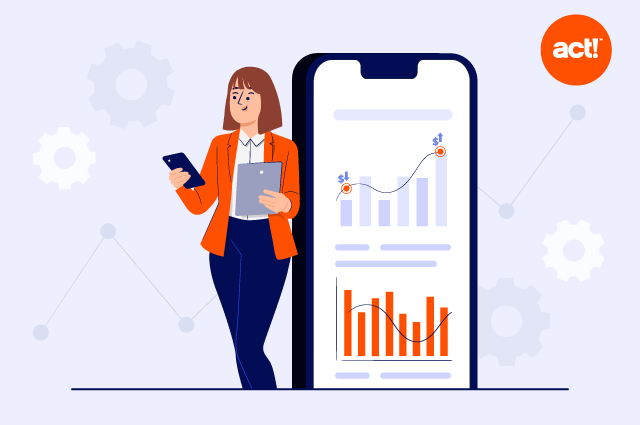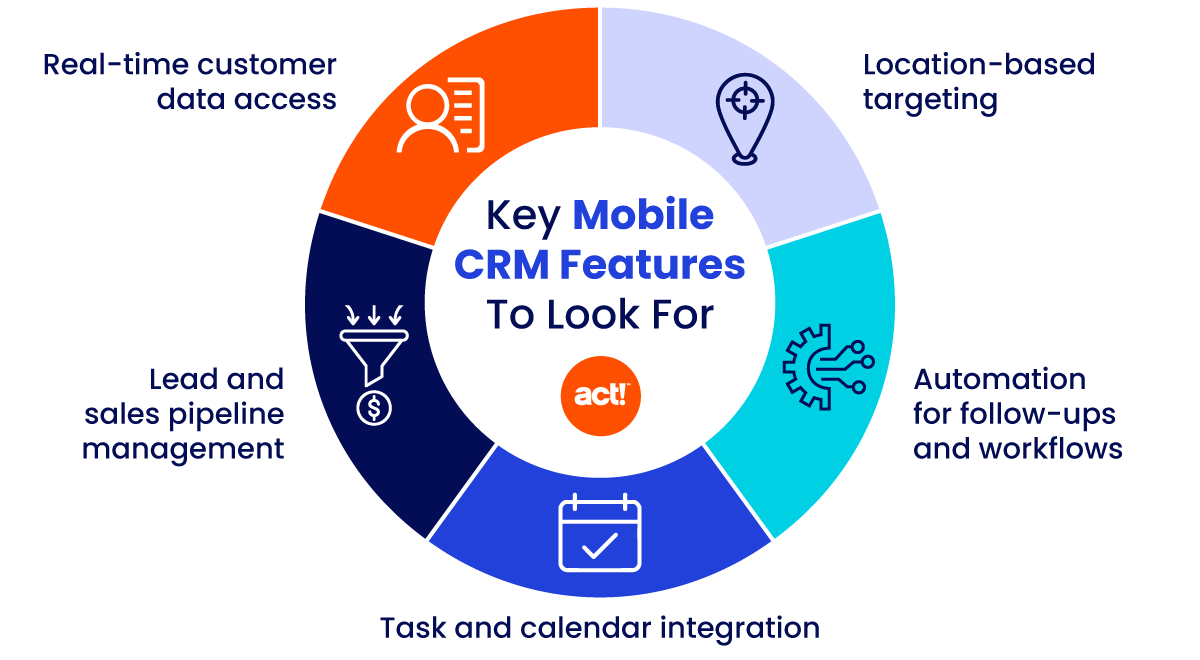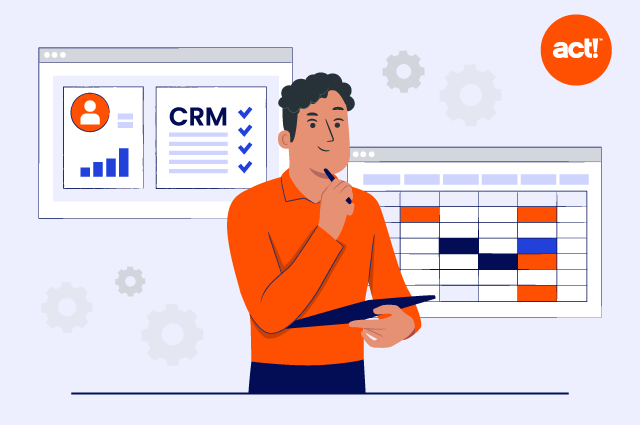
Meet Jake, a sales rep on his way to meet a potential client. Before walking in, he pulls out his phone and opens his mobile CRM app to review the client’s purchase history, past interactions, and any unresolved issues—all in real time.
With the latest insights, Jake personalizes his pitch and moves the deal forward.
Without a mobile CRM system, he’d rely on memory or outdated notes, or spend an hour at his desk searching through a traditional CRM. A mobile CRM solution puts all that knowledge right in a sales or support rep’s hands, making it instantly accessible on the go.
But what exactly is a mobile CRM system? How do you know if your business needs one? And what features should you look for?
We’ll answer all these questions and more in this detailed guide.
What is a mobile CRM app?
A mobile CRM (customer relationship management) system is a CRM app designed for mobile devices like smartphones and tablets, allowing sales teams, support reps, and marketers to access customer data and manage tasks from anywhere.
Unlike a conventional CRM, which requires you to be at a desk, a mobile CRM app provides real-time updates, ensuring team members always have the latest customer information, like customer interactions, deal progress, and task reminders at their fingertips regardless of their location.
Mobile CRM software includes most of the features of a traditional CRM, plus additional mobile capabilities like location tracking, instant notifications, and voice-to-text notes, making it even more powerful for on-the-go professionals.
With a mobile CRM solution, sales reps can close deals the moment a hot lead responds, support agents can resolve customer issues faster, and marketing teams can stay on top of campaign performance without having to be in their workspace.
The benefits of Mobile CRM
A mobile CRM solution gives sales teams, customer support, and marketing professionals the flexibility to work efficiently from anywhere. Here’s how it can directly benefit your business:
Close deals faster with real-time access
A mobile CRM system improves response times by ensuring sales reps have real-time access to customer data, allowing them to act immediately when a hot lead responds. Instead of waiting until they’re back at the office, salespeople can send proposals, update the sales pipeline, and secure approvals — all from their smartphones.
Deliver better customer support
According to McKinsey, 71 percent of customers expect personalized support from brands. A mobile CRM app ensures support agents have instant access to real-time data, including customer interactions and service history, allowing them to offer tailored customer experiences and resolve issues quickly.
For example, if a customer calls with a complaint, an agent can immediately review past customer data, track previous concerns, and offer a solution without switching between different systems or waiting for office access.
Automate follow-ups and stay organized
A mobile CRM system helps businesses automate follow-ups, reducing manual data entry and missed opportunities. For instance, with a mobile app, sales reps at a networking event can log new contacts and schedule automated follow-up emails before even leaving the venue. This ensures leads are nurtured instantly rather than getting lost in post-event paperwork.
Work from anywhere with offline access
A mobile CRM system ensures that sales reps and on-field professionals can access critical customer data, even without an internet connection. Once you’re back online, it automatically syncs all the data with your cloud CRM account. This is essential for industries like real estate, consulting, and field services, where employees often work in areas with limited connectivity.
The key mobile CRM features to look for

A great mobile CRM app goes beyond basic contact management. It should empower your team to work smarter, close deals faster, and provide exceptional customer service. The right features can make all the difference in streamlining workflows and boosting productivity.
Here are the must-have capabilities to look for in mobile customer relationship management software.
Real-time customer data access
The most critical feature a mobile CRM app should have is access to real-time customer data. It should allow users to view, update, and manage customer profiles, purchase histories, and past interactions instantly, whether they’re in a meeting, on a sales call, or handling a support request. With up-to-date information, sales professionals can tailor their pitch, while support teams can resolve issues faster, ensuring seamless customer interactions and better decision-making.
Lead and sales pipeline management
A mobile CRM app should help you track leads and manage your sales activities effortlessly. It should allow you to update lead statuses, set follow-up reminders, and monitor deal progress from anywhere. With a clear pipeline view, you can prioritize high-value leads, engage prospects at the right time, and prevent deals from slipping through the cracks, helping you close more sales and boost revenue.
Task and calendar integration
A mobile CRM app should help you stay organized by integrating seamlessly with your tasks and calendar. It should allow you to schedule meetings, set follow-up reminders, and sync with tools like Outlook or Google Calendar.
For example, with Act!’s mobile CRM, you can get automated alerts for upcoming meetings, set task reminders immediately after a sales call, and view your daily priorities in one place, ensuring you never miss a follow-up and stay on top of key customer interactions.
Automation for follow-ups and workflows
A mobile CRM app should help you automate repetitive tasks, so you can focus on building relationships and closing deals. It should allow you to set automated follow-ups, schedule reminders, and trigger workflows based on customer actions.
Act!’s mobile CRM app lets you automatically send follow-up emails after a sales call, schedule task reminders for overdue leads, and assign follow-ups to team members, ensuring that no opportunity slips through the cracks.
Location-based targeting
A mobile CRM app should help you identify and connect with nearby prospects and customers, making in-person sales more efficient. With location-based targeting, you can see which leads, clients, or opportunities are in your area and plan visits accordingly.
The best mobile CRM apps show you nearby prospects and allow you to schedule last-minute meetings and receive alerts when you’re close to a high-priority lead. This ensures sales reps maximize their time on the road, increase face-to-face interactions, and close deals more efficiently.
How to choose the best mobile CRM app
Selecting the right mobile CRM solution is about finding a system that fits your business needs, integrates smoothly, and remains cost-effective over time.
Follow these five steps to make the best choice:
1. Identify the features you need
Before choosing a mobile CRM app, define what’s essential for your business. Do you need sales pipeline tracking, task automation, geo-location targeting, or customer support tools? Avoid paying for unnecessary features and focus on what will improve your sales processes, customer service, and overall efficiency.
2. Evaluate user experience
A mobile CRM system should be easy to use and require minimal training. A complex interface can slow down adoption and reduce productivity. Test different CRM apps to see how intuitive the navigation is and whether your sales teams and support agents can access key tools effortlessly.
3. Ensure customization and scalability
Your CRM should adapt to your business as it grows. Look for customizable fields, workflow automation, and reporting dashboards that match your processes. Also, ensure the CRM can scale with more users, additional integrations, and expanded data storage as your company grows.
4. Check for third-party app integrations
Your mobile CRM solution should integrate seamlessly with the apps you already use, such as email platforms, accounting software, and marketing automation tools. For example, Act! CRM integrates with Outlook, Gmail, and QuickBooks, ensuring smooth data syncing and minimizing manual work.
5. Evaluate pricing and hidden costs
CRM pricing goes beyond the subscription fee. Consider the total cost of ownership, including setup, customization, additional user licenses, and potential training costs. Some CRMs charge per user, while others offer flat-rate pricing. Choose a CRM that provides the best value without hidden expenses.
Test, compare, and choose the best mobile CRM
Choosing a mobile CRM is a strategic decision that impacts your sales, customer service, and overall efficiency. Take your time, list your options, shortlist the best ones based on your needs, and test them in real-world scenarios.
Not sure where to start? Try our free 14-day trial and download our mobile app to see if it’s the right fit for your business.






